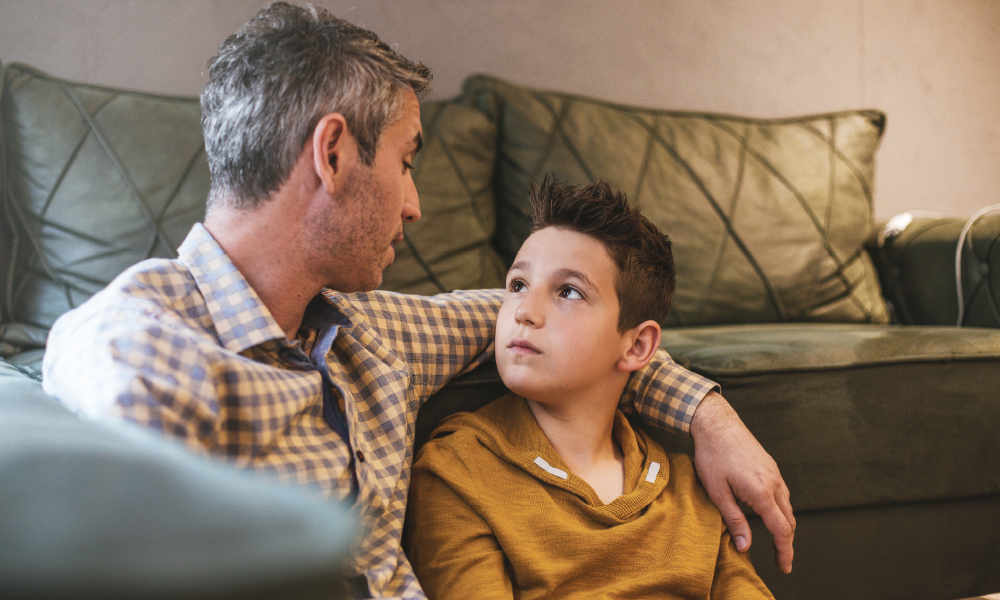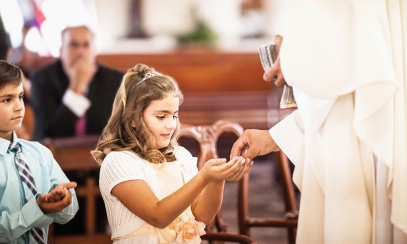
Tips on how to "listen with love"
“Listen with the ears of your heart.” - St. Benedict of Nursia
“Listen with the ears of your heart.” - St. Benedict of Nursia
Our days are filled with noise, and as much as we’d love to tap the “mute” button on the world some days, since there doesn’t seem to be one we’re left with the task of choosing which sounds get our attention. As parents, the voices of our children should be at the top of the list. We must make a distinction, however, between “listening” to those voices and “hearing” them. Truly hearing not only the words, but the emotions and needs that accompany them, matters greatly. Here are some thoughts about quieting the noise to hear our kids.
Our days are filled with noise, and as much as we’d love to tap the “mute” button on the world some days, since there doesn’t seem to be one we’re left with the task of choosing which sounds get our attention. As parents, the voices of our children should be at the top of the list. We must make a distinction, however, between “listening” to those voices and “hearing” them. Truly hearing not only the words, but the emotions and needs that accompany them, matters greatly. Here are some thoughts about quieting the noise to hear our kids.
Primary reason
Listening with love was one of St. Benedict's first rules of warm welcoming hospitality. He knew one way to make people feel loved, valued and included as a child of God was to stop and truly hear what they were saying.
Hit the brakes
Drop everything and listen. Giving someone your complete attention for just a small blip of time can let them know and feel that they matter, and sometimes that is the most healing balm we can apply to a sad, worried or wounded day.
It’s all in the eyes
Hearing involves looking! The extra feeling, meanings and needs that might not be found in the words can be found in the eyes. Stop, sit down, stand up or kneel down so you can make eye contact and see what they might not have the words to say.
Re-wind, re-peat and re-think
Ask questions if you don’t understand, such as, “What were you doing before this happened?” in order to gather some back story and re-think things looking at it from their perspective. An event that may feel minor to an adult can feel like a catastrophe to a young child or a teenager. It’s always a good idea to sum things up and repeat what you think you heard to make sure the focus is on what really happened to them and not your judgments on the situation.
Hearing can be a full contact sport
As much as we want to make things better, sometimes there just aren’t words to do that, but our presence can fill the gap. It’s OK to wrap them in your arms for a hug and say, “I wish I could make this all better,” or “Even if you don’t have the words to explain it all right now, I’ll be right here when you’re ready.”
Ears over opinions
We aren’t always going to agree with our kids and they don’t always need us to tell them how we’d have done it differently. Learning how to be a great human is a process of trial and error, and our kids need to know we love and support them through both. The most helpful advice and opinions are served upon request.
Hearing super power
The Holy Spirit is the giver of words and wisdom. This simple three-line prayer can be repeated again and again to help us listen with our heart and offer the words that can truly help our children: “Come Holy Spirit. Come now. Come as you wish.” Let this powerful little prayer tumble through your head the next time someone wants to talk with you and God will guide what you hear and what you say.
Sheri Wohlfert is a Catholic school teacher, speaker, writer and founder of Joyful Words Ministries. Sheri blogs at www.joyfulwords.org.



